#and then la traviata and don carlos
Explore tagged Tumblr posts
Text
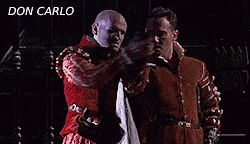
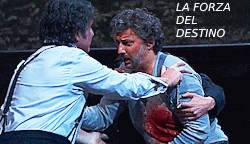
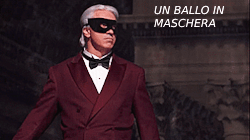
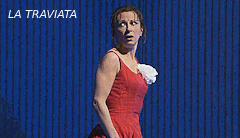
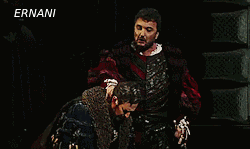
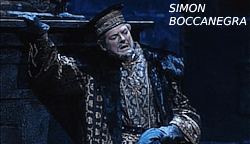
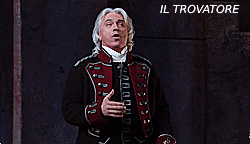
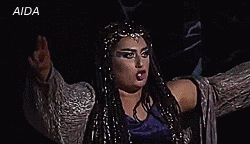
Verdi's Operas compilation
#giuseppe verdi#verdi#opera#don carlo#la forza del destino#la traviata#un ballo in maschera#ernani#simon boccanegra#il trovatore#aida#dmitri hvorostovsky#ludovic tezier#anita rachvelishvili#natalie dessay#mariusz kwiecien#michael fabiano#robert llyod#jonas kaufmann
43 notes
·
View notes
Text

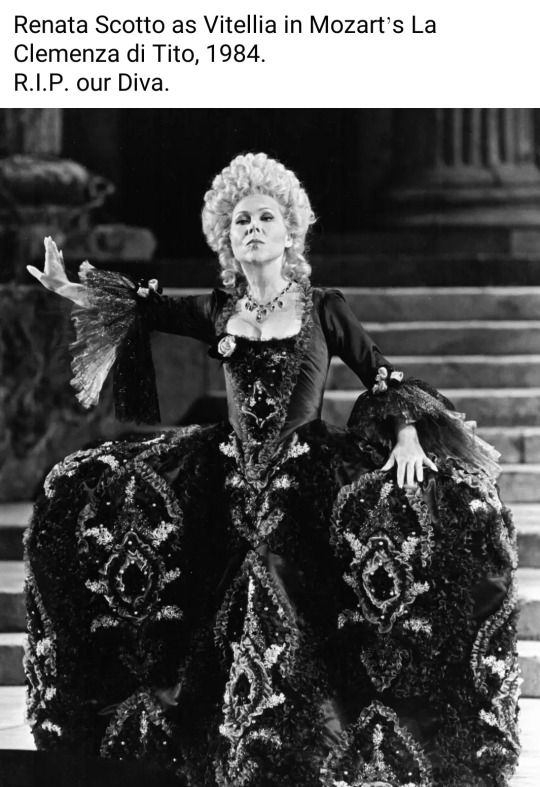

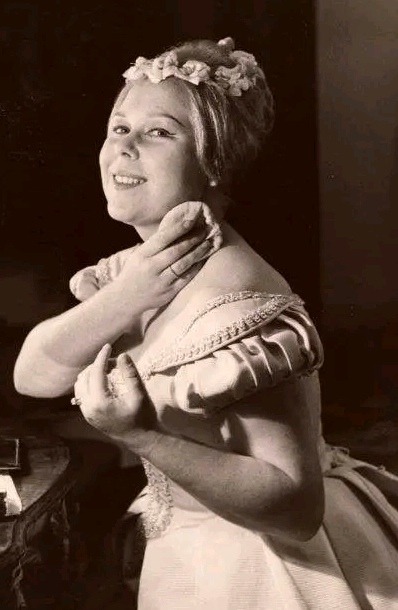
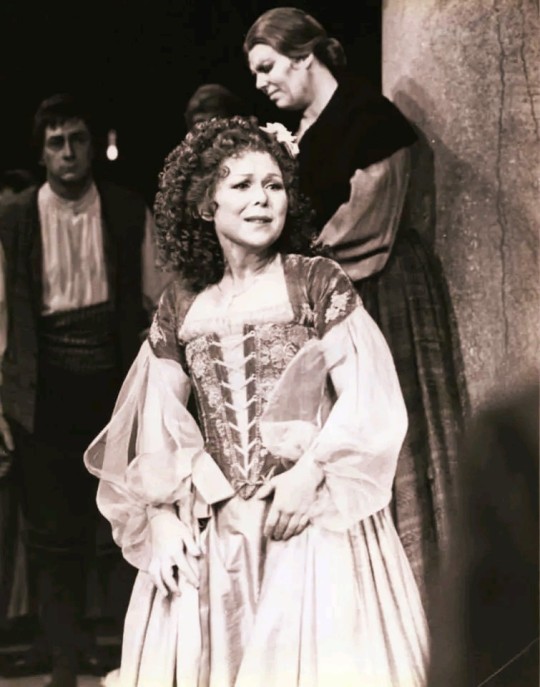



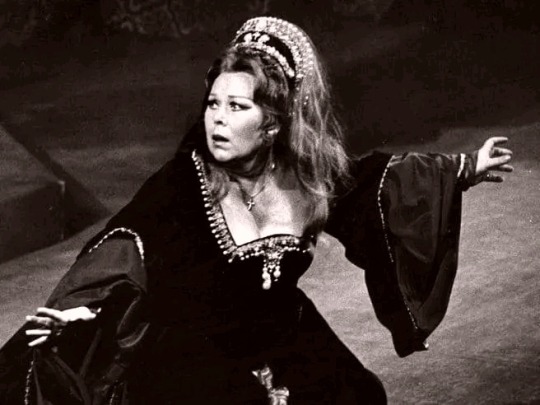

RENATA SCOTTO
as Vitellia in MOZART's *La Clemenza di Tito*, 1984 (ph 1&2)
IDEM
as Violetta Valery in VERDI's *La Traviata* (ph 3)
as Amina in BELLINI's *La Sonnambula* (ph 4)
as La Gioconda (PONCHIELLI) (ph 5)
as Lady Macbeth in VERDI's *Macbeth*
as Elisabetta di Valois in VERDI's *Don Carlo*
as Lucía in DONIZETTI's *Lucía di Lammermoor* Copyright ©️ Tamino Autographs
as Anna Bolena in DONIZETTI's opera of the same name.
in *Iván Susanin*
#4opera+love#4operalove#renata scotto#mozart#la clemenza di tito#giuseppe verdi#la traviata#bellini#la sonnambula#amilcare ponchielli#la gioconda#macbeth#don carlo#donizetti#lucia di lammermoor#anna bolena#ivan susanin
43 notes
·
View notes
Text
Gonna send a call out to opera Tumblr and ask suggestions for which operas I should watch (and how? I have some resources but not all) as I've not seen one in a while and have an urge to change that. The ones I've seen so far are (in no particular order):
Parsifal
La Boheme
Don Carlo
La traviata
Il trovatore
Tristan und Isolde
Tosca
Billy Budd
Romeo et Juliet
Falstaff
Eugene Onegin
Carmen
The Barber of Seville
I'll take suggestions for new ones to see, favorite productions of ones I've already listed, I'll take em all*, so feel free to comment or repost or message me with some suggestions! Just throwing this out into the ether
*Except parsifal. I can't. I can't do that again I'm sorry Wagner (no not really) I entered into that opera unaware of the toll it would take on my psyche and I have not recovered I can't do it again-
#opera#opera tumblr#operablr#if you will#is that what the kids fall it these days#ask#Parsifal#La Boheme#don carlo#la traviata#il trovatore#billy budd#Tosca#etc#I'm missing a few but yeah that's the gist
4 notes
·
View notes
Text
Don Pasquale: *disinherits Ernesto*
Ernesto: Alas, I'm doomed to poverty! I must renounce my beloved Norina rather than let her share my misery!
The Audience: Um... there are other ways of supporting a wife than just inheriting an uncle's fortune, you know.
(To be fair, in past centuries, upper class people couldn't work for a living, or else they'd lose their social standing. I don't know if that was as true in Italy as it was in England, but maybe that's the issue here. Still, to modern audiences at least, Ernesto seems clueless.)
I was kinda inspired by my earlier post and got this idea…
Reblog with your favorite Clueless Tenor Moment
#opera#tenors#die zauberflöte#the magic flute#tamino#les contes d'hoffmann#hoffmann#the rake's progress#tom rakewell#la traviata#alfredo germont#don giovanni#don ottavio#don carlo#don carlos#don pasquale#ernesto
96 notes
·
View notes
Text
Verdian tenors ranked from 'I Like Him' to 'Kill Him with Hammers':
Manrico (Il trovatore): he's a teenager in love. what else do you need me to say. he enters the scene serenading his beloved, like a guy holding a boom box over his head. he's a reckless hothead who's not afraid to get into fights shouting "what are you gonna do, stab me?". and he's a mama's boy. he admittedly loses a few points for getting angry at leonora when she comes to rescue him, but he's awaiting execution, so he's not thinking clearly. mitigating circumstances. he dies as he lived – in the most dramatic way possible. I wish more tenors were like him.
Don Alvaro (La forza del destino): destiny's favourite chew toy. unluckiest man on the face of the earth. you can't help but feel sorry for him. I don't know if this counts as "liking" him, but it's gotta count for something.
Ernani: look I don't LOVE him, but his has gotta be the second coolest job on this list after "troubadour". he's a bandit in a cool, robin hood sort of way. literally just having a merry time with his men. sure, the whole oath with silva was dumb, but well, he's a tenor. kudos for following through with it.
Don Carlo: flop tenor. go girl, give us nothing. well done on the homoerotic duet and unrequited love and mysterious abduction by a monk. splendid work. but to me he comes across as a bit whiny. he exists on the same continuum of suffering as don alvaro, but towards the cringer end of the spectrum, which is why he doesn't rank higher.
Middle of the pack – Arrigo (La Battaglia di Legnano) / Arrigo (I vespri siciliani) / Radamès (Aida): military men. they're OK, I guess. la battaglia's arrigo gets bonus points for jumping out of a window to follow his men into battle and swearing loyalty to a corp called the knights of death, are you kidding me? that's metal as hell. unfortunately he's stuck in a fairly forgettable opera and he's also mean to his love interest for no reason (as per). i vespri's arrigo has potential – torn between personal and political interests, plus being part of a love triangle that would, in my opinion, work very well as a triad (based on what? vibes. don't worry about it.) radamès... I mean, he gets sealed alive in a tomb with his beloved. romeo and juliet's level of tragic lovers. Ultimately though they're all just some guy to me. they've not done anything especially offensive, but they don't stand out either.
Riccardo (Un ballo in maschera): look, I don't hate him. I'm kind of fond of him, actually. but one has to face the facts, which are – 1. he was ready to fuck his best friend's wife (he doesn't go through with it, but I don't think he deserves points for that) 2. he's more than a little dumb. he literally gets told who will kill him – the guy whose wife he is planning to seduce – and still he goes, "my best friend? I cannot think of any reason why he should want to kill me!" not the sharpest knife in the drawer, and a bad friend to boot. sure, there are worse sins, but there are better tenors. he's funny though.
Gabriele (Simon Boccanegra): Sento avvampar nell'anima is such a banger, but jealous tenors who make a scene and accuse their love of being unfaithful is never a good look, and he borderline threatens to kill her, so. he ain't it.
Alfredo (La traviata): I don't care that he repents immediately, he humiliates Violetta in public because she dared leave him for someone else, after he promised to love her forever and sucked her dry. she might have forgiven him at the end but I did not.
Rodolfo (Luisa Miller): murder-suicide immediately gets you to the bottom of the list as far as I'm concerned. how dare you? just kill yourself next time. at least he has the decency to sing a beautiful duet before dying. least he could do.
Otello: see above + I don't like this opera.
Duke of Mantua (Rigoletto): there's something so infuriating about this man. he's a bully and a rapist. he drives a girl to suicide. he learns nothing from this. he never even finds out! he's superficially charming and silly, so people forget how despicable he truly is. but not me. not me.
Not classified:
Macduff (Macbeth): it ain't about him.
All other tenors: I don't know them.
#opera#giuseppe verdi#la traviata#rigoletto#il trovatore#un ballo in maschera#la forza del destino#luisa miller#ernani#fave tenor ≠ fave opera btw. rigoletto slaps.
28 notes
·
View notes
Note
as of today, there are 105 different operas and operatic works bookmarked in the Opera Fics collection.
24 Italian Art Songs and Arias Aida - Verdi/Ghislanzoni Akhnaten (1983) - Philip Glass Andrea Chénier - Giordano/Illica Ariadne auf Naxos - Strauss/Hofmannsthal Ariane et Barbe-Bleue—Dukas/Maeterlinck Attila - Verdi/Solera Billy Budd - Britten/Forster & Crozier Carmen - Bizet/Halévy & Meilhac Catone in Utica - Pietro Metastasio Cavalleria rusticana - Mascagni/Targioni-Tozzetti & Menasci Così fan tutte - Mozart/Da Ponte Der fliegende Holländer | The Flying Dutchman - Wagner Der Freischütz Der Ring des Nibelungen | The Ring of the Nibelung - Wagner Der Rosenkavalier | The Knight of the Rose - Strauss/von Hoffmannsthal/von Kessler Dialogues des Carmélites - Poulenc/Bernanos Die Csárdásfürstin | The Gypsy Princess - Kalman/Stein/Jenbach Die Entführung aus dem Serail - Mozart/Bretzner Die Fledermaus - Strauss Die Lustige Witwe | The Merry Widow Die Meistersinger von Nürnberg - Wagner Die Zauberflöte | The Magic Flute - Mozart/Schikaneder Don Carlos | Don Carlo - Verdi/du Locle/Méry Don Giovanni - Mozart/Da Ponte Don Pasquale-Donizetti/Ruffini Drot og marsk | King and Marshal - Heise/Richardt Ernani - Verdi/Piave Eugene Onegin - Tchaikovsky Faust - Gounod/Barbier Florencia en el Amazonas - Catán/Fuentes-Berain Giulio Cesare in Egitto - Händel/Haym Guillaume Tell- Rossini/de Jouy/Bis I Capuleti e i Montecchi - Vincenzo Bellini/Felice Romani I Lombardi alla prima crociata—Verdi/Solera Idomeneo - Mozart/Varesco Il barbiere di Siviglia | The Barber of Seville - Rossini/Sterbini Il tabarro - Puccini/Adami Il trovatore - Verdi/Cammarano Il viaggio a Reims—Rossini/Balocchi Její pastorkyňa - Janáček Juditha Triumphans - Vivaldi/Cassetti La bohème - Puccini/Illica/Giacosa La Cenerentola - Rossini/Ferretti La Clemenza di Tito | The Clemency of Titus - Mozart/Mazzolà/Metastasio La Fanciulla del West | The Girl of the Golden West - Puccini/Civinini & Zangarini La Forza del Destino - Verdi/Piave La Rondine - Puccini/Adami/Willner & Reichert La sonnambula - Bellini/Romani La Traviata - Verdi/Piave La vie parisienne - Meilhac/Halévy/Offenbach La Wally - Catalani/Illica L'amico Fritz - Mascagni/Suardon Le nozze di Figaro | The Marriage of Figaro - Mozart/Da Ponte L'elisir d'amore | The Elixir of Love - Donizetti/Romani Leonore | Fidelio - Beethoven/Sonnleithner & Treitschke Les Contes d'Hoffman - Offenbach/Barbier Les Huguenots - Meyerbeer/Deschamps & Scribe Les pêcheurs de perles | The Pearl Fishers - Bizet/Cormon & Carré Les Troyens - Berlioz Les vêpres siciliennes|I vespri siciliani—Verdi/Scribe/Duveyrier L'italiana in Algeri | The Italian Girl in Algiers - Rossini/Anelli Lohengrin - Wagner L'Olimpiade - Pietro Metastasio Lucia di Lammermoor - Donizetti/Cammarano Lucrezia Borgia - Donizetti/Romani Luisa Miller - Verdi/Cammarano Lulu - Alban Berg Madama Butterfly - Puccini/Illica/Giacosa Manon - Fandom Moses und Aron - Schoenberg Nabucco—Verdi/Solera Norma - Bellini/Romani Oberto Conte di San Bonifacio—Verdi/Solera Orfeo ed Euridice | Orpheus and Eurydice - Gluck Pagliacci - Ruggero Leoncavallo Parsifal - Wagner Partenope - Händel/Stampiglia Pelléas et Mélisande - Debussy/Maeterlinck Polyeucte - Charles Gounod Porgy and Bess -- George Gershwin Rigoletto - Verdi/Piave Robert Devereux- Donizetti/Cammarano Rodelinda (Met Opera 2011) Rusalka - Dvořák/Kvapil Siegfried - Wagner Simon Boccanegra - Verdi/Piave Stiffelio—Verdi/Piave Suor Angelica - Puccini/Forzano Tannhäuser - Wagner The Maid of Orléans - Tchaikovsky The Medium (Opera) The Pearl Fishers (Bizet) The Queen of Spades (opera) The Rake's Progress - Stravinsky/Auden/Kallman The Tales of Hoffmann Tosca - Puccini/Illica/Giacosa Tristan und Isolde | Tristan and Isolde - Wagner Turandot - Puccini Turn of the Screw - Britten/Piper Un Ballo in Maschera | A Masked Ball - Verdi/Somma Un giorno di regno—Verdi/Romani Иоланта | Iolanta - Tchaikovsky Пиковая Дама | Pique Dame - Tchaikovsky Снегурочка–Весенняя сказка | Snow Maiden - Rimsky-Korsakov
This is so crazy exciting!!!! I really should do a sweep of all the theater fandoms again and see if there are any missing operas. Should probably check these old fandoms for new works, too. I haven't done a thorough look since I set up the Opera Fics bookmark.
Thanks, nonny! 😊
#this is such a great update nonny!#apologies that you got lost/forgotten for a couple days#in the barrage of spam asks#opera fanfic
8 notes
·
View notes
Text
characters from verdi operas as dril tweets, in no particular order:
jacopo foscari (i due foscari): see this watch? i got it by Crying. my car? crying. my beautiful wife? Crying. My perfect teeth? Crying. now get the fuck out of my office
grand inquisitor (don carlos): blocked. blocked. blocked. youre all blocked. none of you are free of sin
attila (opera of the same name): joke's on you; i actually love being body slammed by one dozen perfect wrestlers. and my mouth isn't filled with bloodm, it's victory wine
don carlos (opera of the same name): im actualy, probably, the most superbly relatable and normal person in this jail cell as of right NOw
alfredo and annina (la traviata): "Food $200
Data $150
Rent $800
Candles $3,600
Utility $150
someone who is good at the economy please help me budget this. my family is dying"
"spend less on candles"
"no"
#opera tag#opera#dril#verdi#giuseppe verdi#this is all i had in the draft but this has been here for months so post i guess
12 notes
·
View notes
Note
sleepover Saturday!
Recs- My opera rotation (basically Tosca, forza, Don Carlo, Romeo+julliette, Simon boccanegra, traviata)is getting a bit stale as it’s been on repeat for a few years now. Recommendations? Can be similar or drastically different in vibe :)
Ooooh!! I'll try to get pretty diverse stuff:
Andrea Chénier and Fedora (both by Giordano), for some verismo feels!
Falstaff, for some comedic Verdi.
L'amico Fritz (by Mascagni), I've been kind of in the mood since me and my family picked cherries at our farm yesterday.
If you like something similar to Gounod!Roméo et Juliette, how about replaying Faust?
For some lesser-known Puccini, La fanciulla del West and La rondine!
And I have been mostly working on fanfic for L'elisir d'amore!
Don't know if I might add more, but here's some stuff I have so far.
3 notes
·
View notes
Note
unpredictably. i will ask you for your favourite songs by giuseppe verdi
Oughhhhhhh. Okay I'll try
In no particular order, limiting myself to an aria per opera and bearing in mind that the list changes all the time:
Tu che le vanita from Don Carlo
Miserere from Il trovatore
Act 2 duet (Violetta and Germont) from La traviata
Act 4 duet (Alvaro and Carlo di Vargas) from La forza del destino
Vieni, t'afretta from Macbeth
#i literally listed what came to mind first otherwise this would be way too difficult. it was already impossible lol#thank you!!! <3#reponses#cordeliaflyte
9 notes
·
View notes
Text
Wanda Wermińska - Libiamo ne’ lieti calici (Giuseppe Verdi, "La Traviata")
Wanda Wermińska (18 November 1900 – 30 August 1988) was a Polish operatic dramatic soprano and mezzo-soprano.
made her operatic debut in 1923 at the Grand Theatre, Warsaw as Amneris in Verdi's Aida with great success. For the role of Carmen in Bizet's opera, she took dance lessons with the flamenco dancer La Argentina. In operas such as Il trovatore, Un ballo in maschera, Don Carlos, Fidelio, Le nozze di Figaro, Andrea Chénier, Lohengrin, Tannhäuser, Die Walküre and Halka she took on more than forty roles in the mezzo-soprano and soprano genres in the 1920s.
In 1929, Wermińska left Poland and made guest appearances in Vienna, Berlin, Bucharest, Prague, Riga, Stockholm, Copenhagen, Milan, Rome, Venice, Madrid and Alexandria, among other places. In Budapest she appeared alongside Feodor Chaliapin in Faust, which invited her to perform in Boris Godunov at several European theatres.
During the period of the Second World War, Wermińska lived in South America, where she had engagements in Argentina (Teatro Colón), Brazil, Chile and Mexico, under the conductors Bruno Walter Fritz Busch and Wilhelm Furtwängler and with soloists such as Kirsten Flagstad, Maria Caniglia, Fedora Barbieri, Beniamino Gigli, Lily Pons and Mario del Monaco.
She returned to Poland in 1947, where she continued to perform as an opera and concert singer, also on radio and television, and worked as a music teacher. She was highly regarded as the "Mother of Polish Opera".
#classical music#opera#music history#bel canto#composer#classical composer#aria#classical studies#maestro#chest voice#Wanda Wermińska#Wermińska#dramatic soprano#soprano#mezzo soprano#Giuseppe Verdi#Verdi#La Traviata#classical musician#classical musicians#classical voice#classical art#musician#musicians#history of music#historian of music#diva#prima donna
6 notes
·
View notes
Text
"Ser titular de una orquesta como la ROSS sería un placer"

[Giacomo Sagripanti ayer en el Maestranza, momentos antes de esta entrevista / Juan Carlos Muñoz]
El maestro italiano vuelve a dirigir a la ROSS, casi una década después, con un programa que incluye la Sinfonía de Réquiem de Benjamin Britten y la Sinfonía nº4 de Gustav Mahler
El director italiano Giacomo Sagripanti (Giulianova, Abruzzo, 1982) dirigirá jueves y viernes en el Teatro de la Maestranza, donde tiene lugar esta entrevista, el programa Gran Sinfónico 3 de la ROSS, que, dentro del ciclo Andalucía Sinfónica, la orquesta sevillana llevará también el domingo al Villamarta de Jerez. Sagripanti vino por primera vez a Sevilla en febrero de 2014 para dirigir una Cenerentola de Rossini y un concierto sinfónico y regresó con la ROSS en noviembre de 2015.
Pregunta.–¿Qué recuerdos tiene de aquellos conciertos?
Respuesta.–Vine para hacer Cenerentola, pero el director que estaba previsto para el concierto sinfónico aquella semana tuvo una baja y, como era un programa italiano, me lo pidieron a mí. Lo recuerdo muy bien. Fue muy interesante, pero ahora es mejor porque tenemos tres días de ensayos en el mismo escenario del concierto y eso es un lujo.
P.–¿Cómo ha encontrado a la orquesta?
R.–Más joven. De repente se ha convertido en una orquesta de jóvenes. Eso es normal, porque en diez años se producen muchos cambios. Muchos de los que quedan me recordaban y vinieron a saludarme al camerino. Creo también que ahora es mejor orquesta. Lo aprecié desde la primera lectura. Fueron muy profesionales, muy atentos a todos los detalles y muy disciplinados. Pienso que han aprovechado estos diez años para mejorar.
P.–Viene de hacer un Nabucco en Toulouse y mirando su agenda le siguen Rondine, Don Pasquale, Turco in Italia, Traviata, Trovatore, Barbero... ¿Se considera básicamente director de ópera?
R.–Intento hacer cinco o seis programas cada año en sinfónico. El mes próximo debuto en la Philharmonie de París con la Orquesta de Cámara de París y la 7ª de Beethoven. Una muy buena orquesta con un programa muy interesante. Es cierto que he ganado mi fama haciendo ópera, y la ópera me permite trabajar en todos los grandes teatros del mundo, Viena, Londres, París, Madrid, este año también Nueva York. Pero intento siempre hacer programas sinfónicos con orquestas buenas. No he trabajado todavía con la Filarmónica de Berlín o la de Viena, pero puede ser que eso llegue algún día. Lo que me interesa es no parar con el sinfónico y hacer mucho repertorio, que es muy importante.
P.–¿Cuál es para un director la principal diferencia entre ambos repertorios, la ópera y el sinfónico?
R.–Hay enormes diferencias. En el estudio y en la técnica. El trabajo del director de ópera italiana es técnicamente el trabajo más virtuoso, el más difícil. Porque es un trabajo puramente técnico: en escena pueden pasar mil cosas y mantener la coordinación es esencial. El trabajo del sinfónico no tiene los problemas que tiene un teatro, el foso, la distancia, el coro, los solistas, la escena, pero tienes otras cosas que son detalles de trabajo musical. Es más fácil ir todos juntos con el sinfónico, porque hay solo una plantilla, pero es mucho más difícil buscar sonidos, atmósferas, los matices, es una cocina más refinada, si quiere. Para un director de ópera es importante hacer sinfónico, porque en el foso puedes utilizar este refinamiento del sonido que debes tener en el sinfónico. Es algo que te sirve para destacar detalles en una obra de Verdi, por ejemplo, en la ópera francesa o en Puccini, que es un compositor muy sinfónico, por no hablar de Wagner. Uno puede empezar haciendo ópera de joven y con el tiempo ir metiéndose en el sinfónico. Al revés es mucho más difícil, por esa cuestión técnica que le decía, porque tienes que acostumbrarte a muchísimas más cosas. Yo empecé con la ópera belcantista, pero siempre haciendo sinfónicos. Por supuesto que en ese terreno también hay obras de gran dificultad técnica –pienso en Stravinski, por ejemplo–, pero lo puedes preparar: el 99% de lo que ensayas sale en el concierto. En la ópera es imprevisible. Un día un cantante no tiene la voz como el día anterior y tienes que cambiar el tempo, las dinámicas..., y de todo eso tienes que darte cuenta sobre la marcha, en el foso, comprender la situación al instante y hacerlo.
"El trabajo del director de ópera italiana es técnicamente el trabajo más virtuoso, el más difícil. Porque es un trabajo puramente técnico: en escena pueden pasar mil cosas y mantener la coordinación es esencial"
P.–¿No lo han vuelto a llamar del Maestranza para una ópera?
R.–Muchas veces, pero no he podido por problemas de agenda. Este año me propusieron Turandot, y en este caso me lo impidió un problema familiar. Buscamos un proyecto más corto y salió este concierto, que me interesa muchísimo.
P.–Una obra no muy difundida en nuestro entorno, la Sinfonía de Réquiem de Britten, y una muy popular, la 4ª de Mahler...
R.–Me interesó mucho la propuesta. Primero, porque la obra de Britten no la había dirigido nunca. Segundo, porque temáticamente es muy interesante: todo el programa se modula en torno a la muerte. La obra de Britten es un Réquiem sin palabras. Cada uno de los tres movimientos lleva el título de un número de la misa de difuntos: Lacrymosa, Dies Irae, Requiem Aeternam. Eso parece significar que quiso dar una dirección muy clara a cada movimiento, y en este sentido es una obra si quiere expresionista, pero en la interpretación los dilemas son puramente musicales: mucho contrapunto, una orquestación muy interesante, muy del siglo XX. Todo se basa en la construcción del sonido. Mahler es otra cosa. La 4ª es la última de sus sinfonías Wunderhorn. Y la plantea como un viaje a la muerte, pero desde el punto de vista infantil. Toma el texto del poema y a la vez este concepto de muerte muy alemán y muy eslavo, porque la muerte en este mundo es una parte de la vida. Hay que aceptar la muerte con una sonrisa, como lo puede hacer un niño. Y esa es una idea muy mahleriana. Para nosotros los latinos tiene algo de macabro. Pero en la cultura alemana es normal: ver la muerte con los ojos de un niño y hacer bromas con la muerte. El primer movimiento de la sinfonía es una descripción muy infantil del mundo terrenal, de lo que pasa en la vida. Pero llega entonces una llamada de las trompas, que es la llamada de Dios, y empieza también a jugar con el fídel, el instrumento del diablo [Mahler lo representa con el primer violín en scordatura, un tono más alto]. Es el segundo movimiento, una danza de la muerte, otra figura típica de la cultura alemana, que Berlioz y Liszt también utilizaron. El tercer movimiento es el más mahleriano, el más profundo, el que expresa el sufrimiento por la muerte. Y en el cuarto se abre la puerta del paraíso para mostrar todo este mundo infantil, de una gran dulzura, hasta el punto de que todo termina como en un sueño. Estás vivo, y esa es la magia de la obra, que cierra todo un mundo en Mahler.

[Otra foto de Giacomo Sagripanti tras el ensayo del miércoles por la mañana en el escenario del Maestranza / Juan Carlos Muñoz]
P.–Cuando estuvo en Sevilla en 2014, la ROSS buscaba director y su nombre estuvo entre los candidatos. Ahora curiosamente la orquesta vuelve a buscar director, ¿lo han sondeado?
R.–No lo sabía. Me enteré al llegar. Yo no tengo de momento una orquesta y considerar una orquesta sinfónica del nivel de la ROSS es seguramente un placer. Creo que estas cosas dependen de muchos factores... He tenido algunos puestos de responsabilidad en teatros y orquestas, pero creo que son cosas que no pueden forzarse, tienen que salir de forma muy natural...
P. –¿Lo consideraría si se lo propusieran?
R.–Claro que sí, porque Sevilla es una ciudad que adoro, tengo muchísimos recuerdos extraordinarios de aquí. Y la orquesta tiene ahora mucho mejor nivel que hace diez años. Para mí como director italiano ser titular de una orquesta como esta sería un placer. Además hago ópera en los mejores teatros del mundo. Me consta que ha habido problemas de coordinación entre la ópera y los conciertos sinfónicos en este teatro. Y creo que sería la primera vez que en la ROSS puede haber un director artístico que también puede hacer ópera al máximo nivel. Sería una opción muy interesante, pero ya le digo que tiene que ser algo que surja de forma natural. Mi relación con los músicos de la orquesta está siendo muy buena, soy feliz por estar aquí y si en la orquesta también están contentos conmigo... Ya veremos lo que pasa.
[Diario de Sevilla. 10-10-2024]
0 notes
Text
Canal de TV “Film & Arts” em maio/2024
O canal de TV “Film & Arts” está disponível nestas operadoras:
Claro TV: Canal 148; Canal 648 (HD)
SKY: Canal 116; Canal 516 (HD)
NET: Canal 148; Canal 648 (HD)
Clique no item abaixo para ver as datas/horários em maio/2024.
Canção Secreta - Alban Berg´s Lyric Suite
Ópera do Mendigo - Robert Carsen
Anna Netrebko & Rolando Villazón- La Traviata
Concerto de Paris 2023
Montserrat Caballé canta Norma
Sonho de uma noite de Verão
Moisés - Gioachino Rossini - Duomo Di Milano
Arthur Rubinstein - Chopin
Kathleen Battle & Jessye Norman
Três tenores - de Caracalla para o mundo
Don Quixote, com Marianela Nuñez e Carlos Acosta
Lucia di Lammermoor- Piotr Beczala
O anel centenário em Bayreuth
Viscera/ Tarde de um Fauno/ Tchaikovsky Pas De Deux/ Carmen
O Barbeiro de Sevilha
0 notes
Text
Luciano Pavarotti
After a bit of waiting, my second blog is finally up... the name is self-explanatory, and who better a great opera singer to kick this blog off with than the late Luciano Pavarotti (1935-2007).
youtube
The first time I heard Luciano Pavarotti's voice, it was on a recording of Puccini's Madama Butterfly; this was the famous recording with Luciano's childhood friend Mirella Freni (who, incidentally, never sang the part on stage). Luciano had sung the part of Pinkerton a couple of times on record; according to the BBC Classical Music website, the very first time he did so was in 1963 in Northern Ireland's Grand Opera House. He performed this role only a few times early in his career; however, he did sing Pinkerton's short aria "Addio, fiorito" in concert in his later years.
Hailing from Modena in Italy, Luciano Pavarotti had loved singing since he was a boy, however an impromptu rendition of "Vesti la giubba" (from Leoncavallo's Pagliacci) at the age of 5, made his neighbors tell him to shut up. Luciano began his formal training as a young adult under Arrigo Pola, and he made his operatic debut as Rodolfo in Puccini's La Boheme at Reggio Emilia in 1961. This role would become one of his most renowned roles, and one with which he would make several of his opera house debuts. The story goes that during one performance of Boheme, Luciano delivered Rodolfo's act 1 aria "Che gelida manina" - which contains a famous high C near the end - and as he finished the aria, even the soprano standing next to him came completely out character, turned to him, and joined the congregation in applause!
youtube
Over time Luciano would associate himself largely with the operas of Verdi and Puccini. He himself has confessed that he has performed the role of Cavaradossi in Puccini's Tosca more than any other role in his career. He has also done the Duke in Verdi's Rigoletto, Alfredo in Verdi's La Traviata, Radames in Verdi's Aida, the title roles in Verdi's Il Trovatore, Verdi's Don Carlo, and Giordano's Andrea Chenier, and perhaps most famously, Calaf in Puccini's Turandot.
The role of Calaf has largely been associated with Luciano because of the Act 3 aria, "Nessun dorma", which needs no introduction. Luciano sang Calaf on stage only twice in his career - in 1977 at San Francisco, with Montserrat Caballe as Turandot and Riccardo Chailly at the baton; and again 20 years later in 1997 at the Metropolitan Opera in New York, with Jane Eaglen as Turandot and Maestro James Levine conducting. The latter recording is one of the most difficult to find; several audio excerpts exist online, as does a small video of him singing the "No no principessa altera" from Act 2, complete with its long, seemingly unending high C (see video below), but to date there is no known complete audio or video of this performance. The Met has yet to announce a release.
youtube
The relationship between Luciano and Levine has long been one of the best ever; many are aware that both were more than just friends or colleagues. It was "Jimmy" who encouraged Luciano to expand his repertory and take on more roles (I have discussed a lot about this in my Pride Month tribute post to James Levine in my mane blog). Under Levine's guidance, Luciano took on such demanding roles as Calaf and Chenier, as well as - yes, this is wacky but legit - the Italian Singer in Richard Strauss's Der Rosenkavalier in 1982!
youtube
And Levine didn't stop there; he encouraged Luciano to take on more, language-wise. Luciano admitted in his autobiography that he loved French opera, and two roles he always wanted to sing on stage were the title role in Massenet's Werther and Don Jose in Bizet's Carmen. Indeed, Werther's Act 3 aria "Pourquoi me reveiller?" had always been one of Luciano's favorites to perform live as a concert piece - he even did so at one of the Three Tenors concerts, as you can see in this next video.
youtube
Luciano was all set to do his first Werther in 1991 at Covent Garden; but the performance was taken over by the British conductor George Solti, who decided that the performance would be a concert performance of Verdi's Otello instead.
Then the cancelations began, those which Luciano became very infamous for in his later years. In 1996, not long after doing his first Chenier under Levine, Luciano was going to do his first Don Jose at a Xmas performance of Carmen, with Waltraud Meier in the title role (and again with Levine conducting); but - shockingly - he fell ill and canceled at the eleventh hour. In her book, Molto Agitato, reporter Johanna Fiedler recounts that when it was announced that Luciano had called in ill and was canceling Don Jose, the Met's general manager Joe Volpe allegedly said to the audience in a pre-show announcement: "The good news is that Mr Pavarotti asked me to send you all his holiday greetings. The bad news is that he sends you his greetings from Modena." Luciano was understudied in the role of Don Jose for that performance by his good friend, tenor Placido Domingo. (Luciano did, however, recover in time to perform Calaf the year after.)
Luciano never stopped trying new things out. In 1994, for the soundtrack of the Charlie Sheen movie The Three Musketeers, he recorded the theme song "All for love" with Bryan Adams, one of his first forays into modern popular music:
youtube
Of course, Luciano never lost his roots; he was no stranger to the traditional Arie Antiche, the series of 24 Italian songs and arias from the 1700s compiled by Alessandro Parisotti which today are used primarily for music pedagogy, especially vocal auditions. In fact, he adored these arias, and always opened every recital with one. Here is Luciano's rendition of "Caro mio ben", perhaps the single most infamous Arie Antiche ever, accompanied by La Scala's music director Riccardo Muti on piano, from 1995:
youtube
As the new millennium began, Luciano performed Radames in Verdi's Aida at the Met in 2001, with Deborah Voigt in the title role and again with Levine conducting. His farewell to the stage was in 2004 as Cavaradossi in Puccini's Tosca, one of his most renowned roles, with Carol Vaness in the title role, Samuel Ramey as Scarpia, and again with his beloved "Jimmy" Levine at the podium.
The world mourned Luciano's loss in September 2007, after he passed away at the age of 72, reportedly of a heart attack due to his weight, with which he struggled for much of his life. We are all the poorer for Luciano's loss. His opera performances on video and record will be his everlasting memorial.
Here, to round it up, is a full-length video of Luciano giving a masterclass at Juilliard in New York in 1979:
0 notes
Text
Here's a big list I've made (because of course I had to) of opera birthdays, for anyone who wants to remember and celebrate them.
(Les Contes d'Hoffmann shares my birthday!)
January
2: Der Fliegende Holländer
3: Don Pasquale
14: Tosca
15: Vanessa
19: Il Trovatore, Manon
21: Jenufa
22: Lady Macbeth of Mtsensk
23: Eugene Onegin
24: I Puritani
25: La Cenerentola, Elektra
26: Cosí Fan Tutte, Der Rosenkavalier, Dialogues des Carmélites
27: Boris Godunov
29: Idomeneo
February
1: La Bohéme, Manon Lescaut
2: Louise
3: Semiramide
5: Otello
6: La Voix Humaine
7: Orphée aux Enfers, Four Saints in Three Acts, Il Matrimonio Segreto,
9: Falstaff, Khovanschina
10: Les Contes d’Hoffmann
11: La Fille du Régiment
16: Werther
17: Madama Butterfly, Un Ballo in Maschera
19: Don Quichotte
20: Il Barbiere di Siviglia, Giulio Cesare, La Wally
23: La Juive
24: Rinaldo
29: La Forza del Destino
March
3: Carmen
6: La Traviata, La Sonnambula
9: Nabucco, Ernani, Die Lustige Weiber von Windsor
11: Rigoletto, Don Carlos, I Capuleti e I Montecchi
12: Simon Boccanegra
13: Médée (Cherubini)
14: Macbeth
16: Thaïs
17: Attila
19: Faust
21: L’Enfant et les Sortileges
27: La Rondine
28: Andréa Chenier
31: Rusalka
April
5: Die Fledermaus
8: La Gioconda
10: L’Amore dei Tre Re
14: Lakmé
15: Serse
16: Alcina, Le Prophéte
25: Turandot
27: Roméo et Juliette
28: L’Africaine
30: Pelléas et Melisande
May
1: Le Nozze di Figaro
5: Mefistofele
12: L’Elisir d’Amore
17: Cavalleria Rusticana
18: Iphigénie en Tauride
19: L’Heure Espagnole
21: Pagliacci, Doktor Faust
22: L’Italiana in Algeri
24: Duke Bluebeard’s Castle, Cendrillon
30: The Bartered Bride
June
6: Moses und Aron
7: Peter Grimes
10: Tristan und Isolde
11: A Midsummer Night’s Dream (Britten)
12: War and Peace
13: Les Vêpres Siciliennes/I Vespri Siciliani
18: Der Freischütz
20: Albert Herring, La Navarraise
21: Die Meistersinger von Nürnberg
26: Die Wälkure
July
1: Arabella
16: Die Entführung aus dem Serail
26: Parsifal
August
3: Guillaume Tell
9: Béatrice et Bénédict
14: Il Turco in Italia
16: Siegfried
17: Götterdämmerung
28: Lohengrin
September
5: La Serva Padrona, Satyagraha
6: La Clemenza di Tito
11: The Rake’s Progress
14: The Turn of the Screw
22: Das Rheingold
24: La Donna del Lago
26: Lucia di Lammermoor
30: Die Zauberflöte, Les Pêcheurs de Perles, Porgy and Bess
October
5: Orfeo ed Euridice
7: The Golden Cockerel
10: Die Frau ohne Schatten
19: Tannhäuser
22: Nixon in China
25: Ariadne auf Naxos
28: Roberto Devereux, Cappriccio
29: Don Giovanni
31: L’Amico Fritz
November
4: Les Troyens, Prince Igor, Intermezzo
6: Adriana Lecouvreur, The Cunning Little Vixen
10: La Forza del Destino
16: Stiffelio
17: Fedora
20: Fidelio
23: Kát���a Kabanová
25: Martha
27: L’Arlesiana, Ruslan and Lyudmila, The Bohemian Girl
December
1: Billy Budd
2: Samson et Dalila, La Favourite
4: Die Tote Stadt
6: La Damnation de Faust
8: Luisa Miller
9: Salome
10: La Fanciulla del West
14: Il Trittico (Il Tabarro, Suor Angelica, Gianni Schicchi), Wozzeck
18: Iolanta
19: Pique Dame, The Ghosts of Versailles
23: Hänsel und Gretel
24: Aida, Amahl and the Night Visitors
26: Norma, Alceste, Anna Bolena
30: The Merry Widow, Maria Stuarda, The Love for Three Oranges
i do think it’s a really fun feature that operas have birthdays. i know that everything can have a birthday if you know how to look at things but i love that every march 6 i see people saying happy birthday la traviata!! and every october 29 i see jokes about how of course don giovanni the opera is a scorpio (although i think don giovanni the character should have been born in may). there’s something so kind about it
96 notes
·
View notes
Text
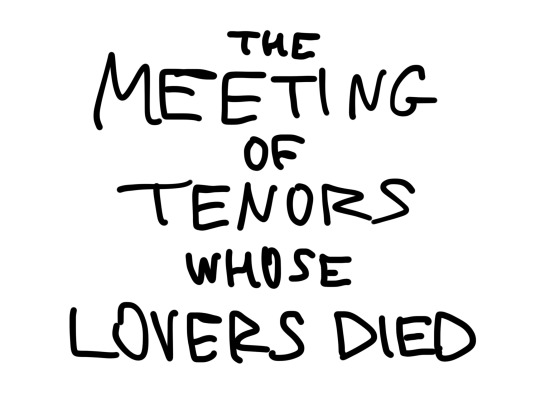
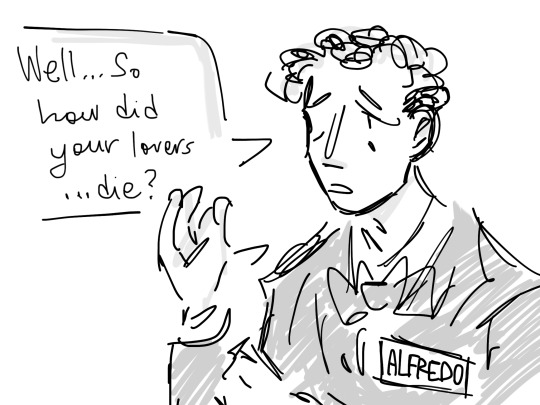
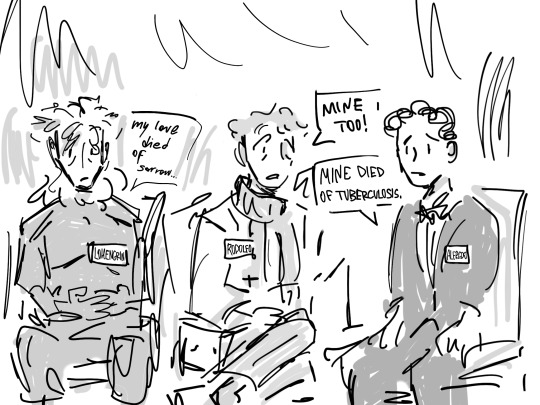
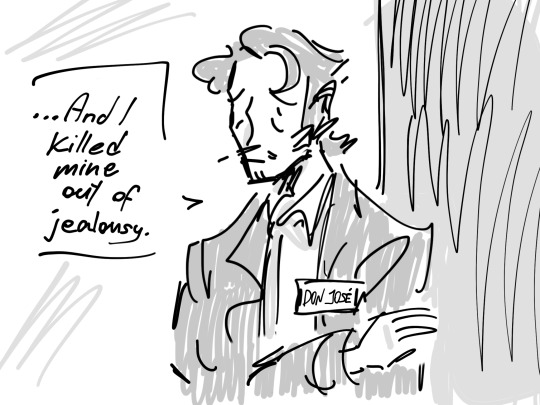
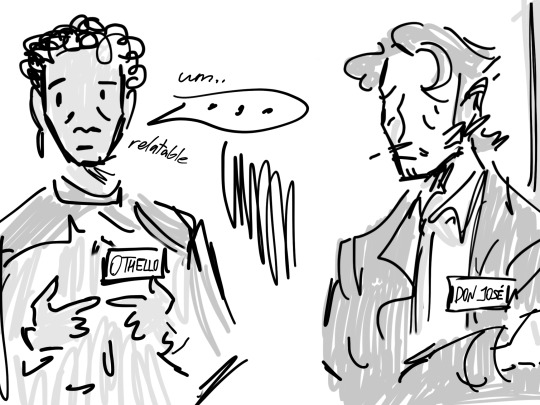
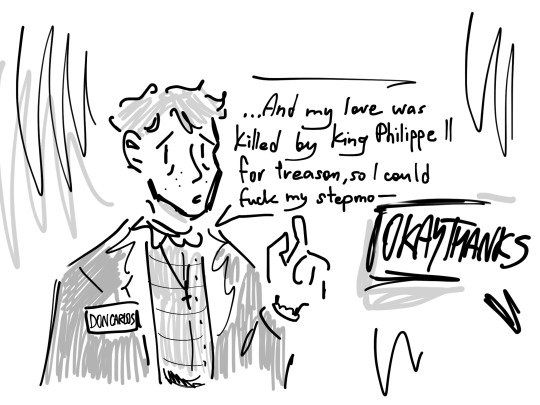
…shit happens
#opera#opera tag#sigh.#la traviata#alfredo#la bohème#rodolfo#lohengrin#carmen#carmen opera#don josé#othello#don carlos#(yes this joke works more with the book plot buut anyway)#yes it looks ugly bc i drew it like in 15 minutes lmao#im sorry
229 notes
·
View notes
Note
@thyroid-deployment The recs from my dear @lenskij are, of course, great, and starting with La Traviata is such a good choice. (It was my first Verdi.) But if you want to get just a little taste of Verdi, as a cellist, I think you will appreciate this aria from Verdi's Don Carlo. It has the most exquisite cello solo!
My cello teacher told me I should start listening to opera. He recommended I start with Puccini or Verdi. Are there any particular operas you'd recommend to start with?
Welcome to opera! There's drama, there's blood, there's crossdressing, vengeance, rivalries, love, and more drama!
There are as many opera opinions as there are opera listeners, and there is so much variety in opera. The most played operas are always a safe bet - there's a reason they're popular! - and it's a good place to start, pick something that tickles your fancy, maybe an intriguing synopsis or a composer you like.
If you want to start with Verdi, I recommend La Traviata and Rigoletto - both are beautiful and devastating in their tragedy. I like to listen to them when I want something familiar to bawl my eyes out at :) I think that's maybe the best place to start!
Another great "starter" opera is Bizet's Carmen. It's full of banger arias and tunes that are well-known even outside of the opera world.
If you want to check out Puccini, I'd recommend La Boheme or Tosca (with the caveat that I don't personally like Puccini operas hehe, they're just not for me).
And of course I cannot not recommend the best opera of all time (as judged by yours truly): Eugene Onegin by the one and only Tchaikovsky. I love it so much I can't even articulate why I love it. It's the inevitable tragedy caused by the characters' own actions, not from malice, but from who they are as people. It's how Tchaikovsky's music beautifully makes the drama soar. It will break your heart and you'll thank Piotr Ilyich for it!
Good luck on your opera journey! There's lots to explore. I mean, the operas listed above are all from the second half of the 19th century, which is just a narrow band of all opera history!
28 notes
·
View notes